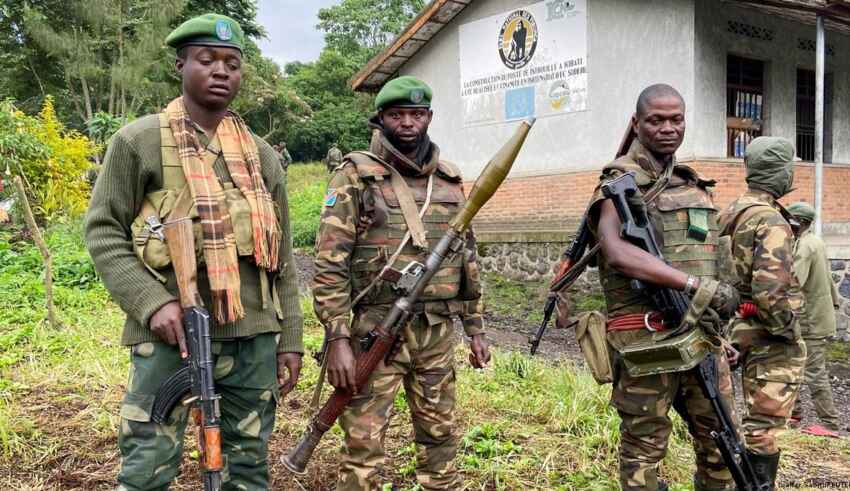
The Democratic Republic of Congo (DRC) has been facing conflict for the past two decades. Following the Rwandan genocide of 1994, Rwanda and Uganda both invaded Congo to seek the perpetrators of the genocide, this resulted on a war breaking out from 1996-97 known as the First Congo war. From 1998-2003 the Second Congo War took place, the Congolese government was then supported by Angola, Namibia and Zimbabwe in its fights against rebel groups, through this period one rebel group emerged and was made up by mostly ethnic Tutsi, it was known as the Congrès National pour la Defense Du Peuple (CNDP). In 2009 when the CNDP laid arms, they were promised that their forces would be integrated into the Congolese army and were to become an official political party, yet a faction of this rebel group did not agree with conditions and transformed into a new rebel group holding the name of Mouvement du 23 Mars (M23) the date of the peace agreement. This group claims to be fighting for the protection of the rights of Congolese people of Rwandan origin.
The M23 have been dormant since 2013 following military defeat but in 2021 a conflict was sparked between the Congolese army and M23 in the eastern part of Congo. As a result, there have been multiple accusations of human rights violations by M23, these include rape, executions, recruitment of people using force, and multiple people have been displaced in order to avoid conflict. The UN and Human Rights Watch have both shown evidential reports about the involvement of Rwanda in its support to the M23,[1] yet the Rwandan government has denied any accusations of support towards the rebel group. In the African Summit, a diplomatic effort from President Denis Sassou Nguesso was made where he asked for the sanctioning of Rwanda and Uganda for supporting the M23 and creating hardships in Congo. It has been proven that most guns are coming from Ugandan manufacturers and that bullets, cars and satellite radios are supplied by Rwanda. Also, the Congolese government has not been an innocent party in the conflict as there are reports of supply of food, ammunitions and arms to the Democratic Forces for the Liberation of Rwanda (FDLR) an armed rebel group in Rwanda who have also been accused of killing of civilians, and sexual violence,[2] although the Rwanda President Paul Kagame has expressed no interest in the conflict in Congo. The conflict between both governments and their influence in political affairs in each other’s countries is highly felt but although evidence is shown by reliable organisations there is no accountability from neither country. From the current affairs it is not too soon to say that the war between the DRC and Rwanda is not imminent.
There is high pressure for the Congolese government to shift the military power in the country, accordingly an attempt to do so is spending thousands on weapon purchases to provide a military advantage over the M23 rebel group. It is well known how the money that goes into war diverts further from efforts of development and education in order to ensure security hence consequently those who suffer are the population. As of now the cost of war is ultimately high, after the UN Security Council lifted the weapon ban in Congo that had been in effect since 2003, the Congolese government increased its defence budget and was then able to trade arms with any country in the world and has spent more than $700 million on the purchase of weapons. For starters, there has been the purchase of Chinese drones CASC Rainbow CH-4 that have never been exported to another country before. Also, there was the hiring of mercenaries who have experience operating this type of system and thus will be operating these drones and helping the Congolese army.
Using mercenaries is not an uncommon tactic for Congo however it has proven before to be detrimental as these fighters hold the experience to conduct military activities but have a form of intensifying the risk of war rather than seeking peace. The interesting thing in this case, is what the presence of these mercenaries and the purchase of foreign weapons mean. For a country still in development going to war is not the wisest choice especially being dependent on foreigners for aid, food, weaponry and so on. The DRC is rich in minerals in this eastern region and the impossibility to conduct mining activities has been proven detrimental to its further development, there is a lost opportunity for economic growth as the Country focuses resources on war affairs
Even though there was a lift on the arms embargo in Congo, the Rwandan and Ugandan manufacturers are indeed contributing to the conflict, so there is a need for intervention to ensure negotiations can take place to apply pressure against these countries who support the rebel groups that have been causing human rights violations. It is one thing for manufacturers to supply weapons to a country’s army and a completely different one to arm a rebel group of a different nation that will instigate more instability. The actions by Rwanda and Uganda have been wrongful based on the evidence provided regardless of their deniability on the matter.
As it stands there is no initiatives from Congo to negotiate with M23 for peace, the war seems to be continuous until one is depleted.
[1] https://www.hrw.org/news/2022/07/25/dr-congo-resurgent-m23-rebels-target-civilians [2] https://www.hrw.org/news/2022/10/18/dr-congo-army-units-aided-abusive-armed-groupsBy The European Institute for International Law and International Relations.













